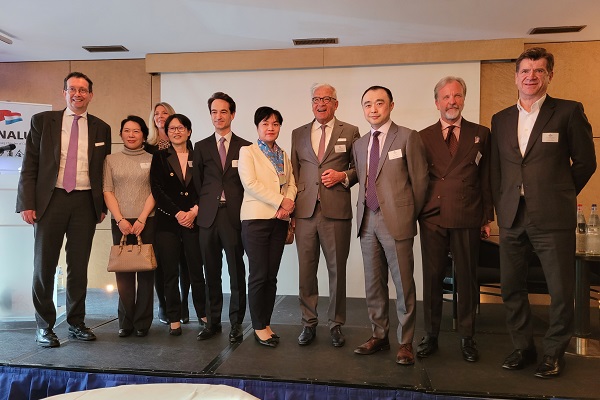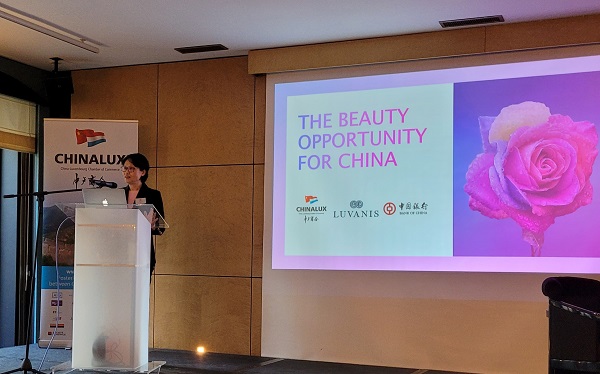 Credit: Jazmin Campbell/Chronicle.lu
Credit: Jazmin Campbell/Chronicle.lu
On Wednesday 19 April 2023, the China-Luxembourg Chamber of Commerce (ChinaLux) held an event dedicated to China’s fast-evolving fragrance market and the revival of dormant brands.
This English-language evening event, called "The Beauty Opportunity in China", took place at Hôtel Le Royal in Luxembourg-Ville. It presented itself as an opportunity for entrepreneurs and investors to capitalise on the popularity of authentic heritage brands in the Chinese beauty market, providing insights into the market but also into the history of perfume and brand revival strategy.
In her welcome speech, ChinaLux President Zhujun Xie noted that after the COVID-19 pandemic and related lockdowns, "China needs a strong economic recovery". She said that Chinese businesses are currently looking abroad, especially to Europe, and recent events, such as the visit of European Commission President Ursula von der Leyen and French President Emmanuel Macron, were a testament to the strong relations that exist between China and the European Union.
The first guest speaker of the evening, French historian and writer Élisabeth de Feydeau, who had travelled over to Luxembourg from Paris, presented "The History of French Perfumery". She took the audience on a 3,000-year journey "through the history of humanity and […] of civilisation", exploring the ancient religious roots of perfume, its revival in western cultures (particularly in Italy and France), first as a symbol of hygiene then as one of luxury, during the Renaissance and at France's 18th-century royal courts, its development during the industrial revolution and the "golden age" interwar periods. This paved the way to modern perfumery (characterised by the introduction of synthetic notes, which decreased production costs) in the 20th century. She spoke of the emergence of niche perfumers and the return of custom and vintage fragrances and brands in the early 2000s, at the dawn of the new millennium.
Continuing on from this, Arnaud de Lummen, founder and Managing Director at Luvanis (a Luxembourg-based company that identifies, secures and grooms dormant brands for revival), delivered a presentation on "The Revival of Dormant Heritage Brands in Beauty". He defined a heritage brand as one that "creates a narrative about its history and leverages its legacy for marketing purposes", citing examples such as Chanel, Guerlain, Louis Vuitton and Hermès. He presented two categories of heritage brands: "Snow Whites", which are generally well-managed and profitable but are rarely for sale, and "Cinderellas", which tend to be mismanaged or unprofitable brands. An alternative for investors is to revive a "Sleeping Beauty", i.e. a long dormant luxury brand which has retained a strong cultural capital. Examples of revived "Sleeping Beauties" include Balenciaga, Moynat, Paul Poiret and Officine Universelle Buly. Such brands will often feature in history books, old films and literature, form part of museum exhibitions or collections, have won medals and awards at international exhibitions and/or have been endorsed by royals or other famous customers.
In his presentation on "The Chinese Fragrance Love Story", Elie Papiernik, founder and CEO at Centdegrés (a Paris-based brand design agency), who had also travelled over from Paris, spoke about the potential of the Chinese market, as well as the importance of design, storytelling, tradition and culture. Referring back to the title of his presentation, he described the need to present fragrances as a love story to Chinese consumers, for whom the culture and story behind a fragrance matters. He presented various figures to back up his observations, noting for example that China is set to become the world's second biggest perfume market by 2030. He also mentioned the popularity of foreign brands in China - although these should also pay attention and even tribute to Chinese culture - and the rise of niche fragrances, particularly among young people.
Following the speeches, ChinaLux Vice President Jacques Bortuzzo moderated a panel discussion, during which the three guest speakers were joined by Marion Bauer (Deputy Director at Bank of China Luxembourg) and Pierre Mallevays (Partner at Stanhope Capital, former Director of Acquisition at LVMH). The panellists discussed the evolution of the Chinese beauty market in recent years, how to identify investment opportunities, the strong links that exist between Luxembourg and China (and the former's potential as a platform for revival brands), the role of artificial intelligence and again the desire for niche and heritage brands (as well as the benefits of purchasing such brands).
Members of the audience also had a chance to ask the panellists their questions on the subject.
The event concluded with a cocktail reception.

Pictured: ChinaLux President Zhujun Xie








